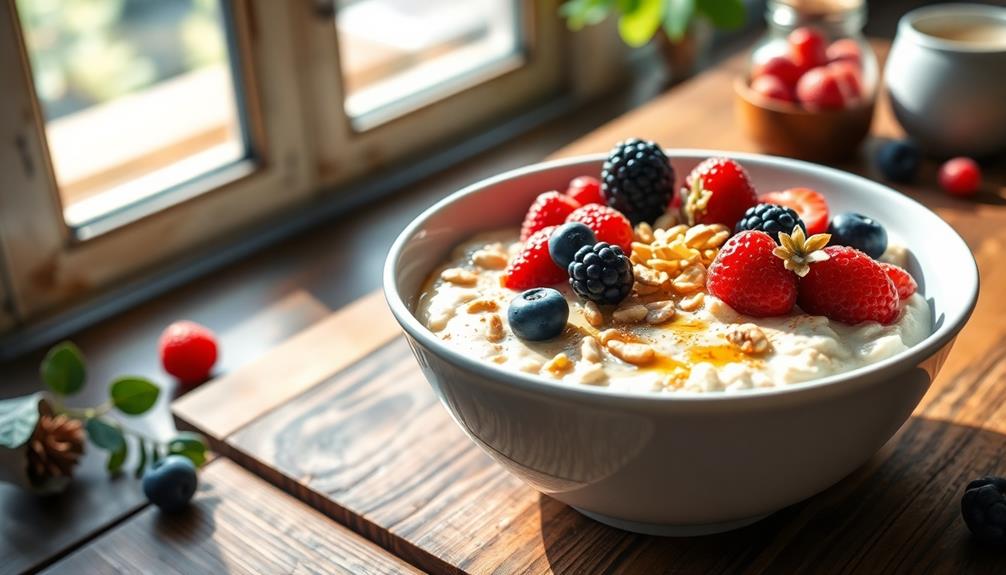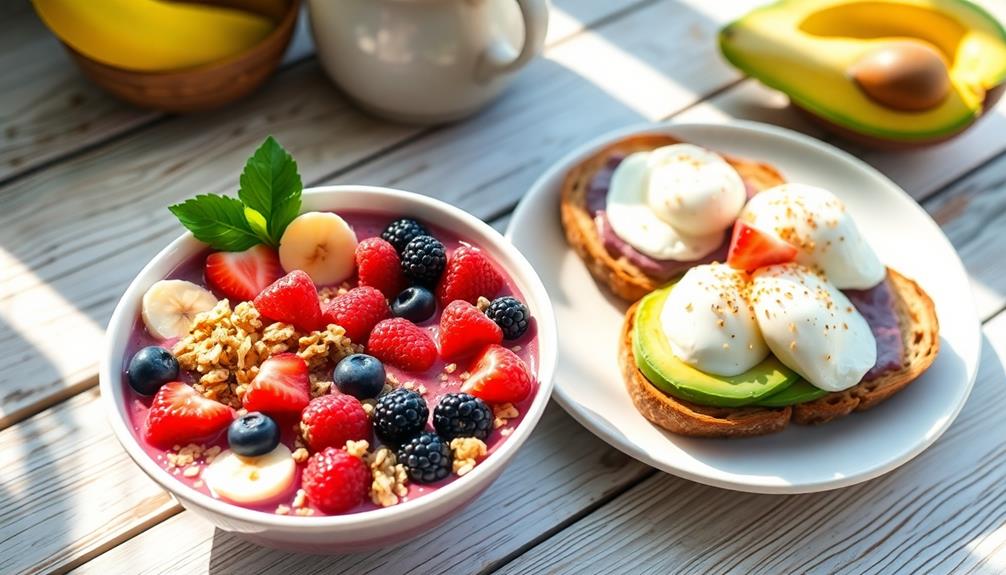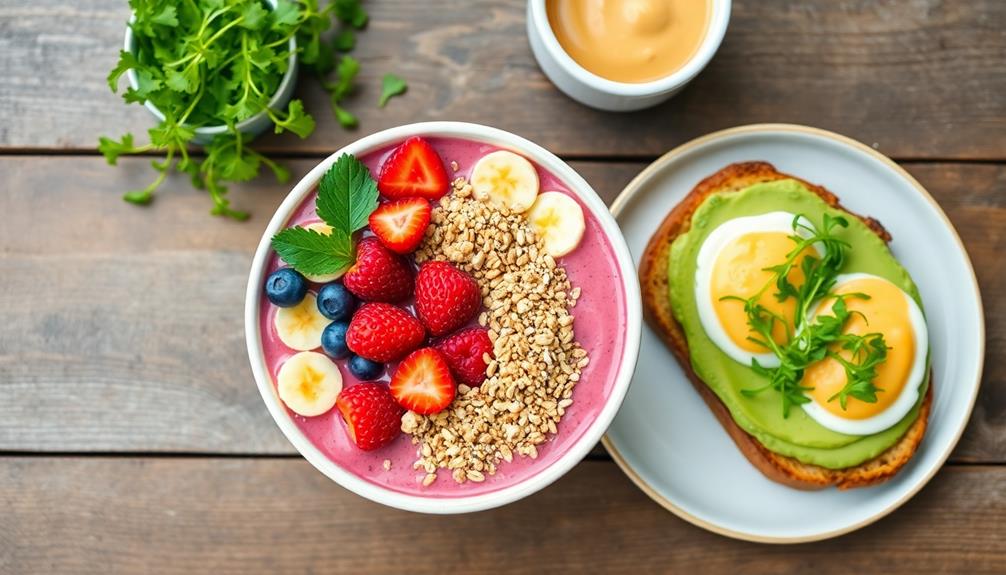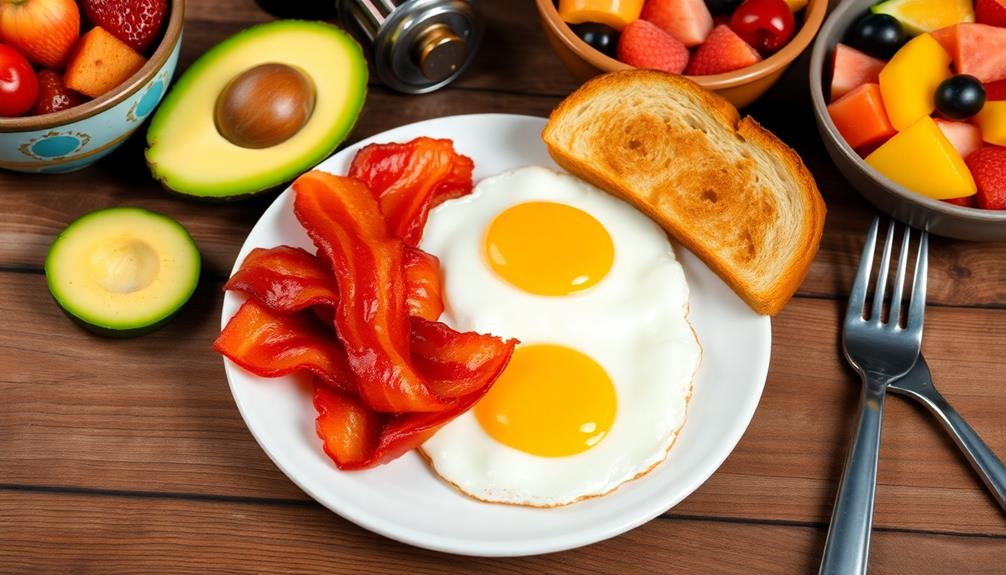Yes, oats are a healthy breakfast option that packs in fiber and essential nutrients. With about 4 grams of fiber per serving, they support digestive health and help keep you feeling full longer. The soluble fiber, beta-glucan, can lower LDL cholesterol levels and improve heart health. Plus, oats have a low glycemic index, stabilizing blood sugar, which is great for energy levels. They're versatile too—add fruits, nuts, or yogurt for extra flavor and nutrition. If you're curious about how to incorporate oats into your diet and discover their full benefits, there's more to explore! Oats are also a great source of the power of protein, making them a satisfying and complete breakfast choice. Protein helps build and repair tissues in the body, and incorporating it into your morning meal can help you feel more satiated and energized throughout the day. Whether you enjoy oats in a warm bowl of oatmeal or blended into a nutrient-packed smoothie, they are a nutritious and delicious way to start your day.
Key Takeaways
- Oats are rich in dietary fiber, providing about 4 grams per cup, promoting digestive health and regular bowel movements.
- The soluble fiber beta-glucan in oats can lower LDL cholesterol levels, contributing to heart health.
- Oats have a low glycemic index, helping to stabilize blood sugar levels and manage diabetes effectively.
- Regular consumption of oats can enhance feelings of fullness, supporting weight management by reducing hunger pangs.
- Oats are versatile and can be enriched with fruits, nuts, or yogurt for added nutrition and flavor.
Nutritional Benefits of Oats
Nourishing your body with oats at breakfast offers a wealth of nutritional benefits that can boost your health. Oats are packed with dietary fiber, providing around 4 grams per cup, which covers about 14% of your daily value. This fiber is essential for your overall health, helping to regulate your body's functions.
One standout component of oats is the soluble fiber called beta-glucan. This powerful fiber can effectively lower LDL cholesterol levels, reducing your risk of heart disease by up to 14%.
In addition to its heart-healthy benefits, oats have a low glycemic index, which means they help stabilize blood sugar levels. This makes oats an excellent breakfast choice, especially for individuals managing diabetes.
Moreover, including oats in your morning routine can enhance feelings of fullness, which may lead to reduced calorie intake throughout the day, supporting your weight management efforts.
With their rich combination of essential vitamins and minerals, oats truly stand out as one of the healthiest foods you can choose for breakfast. So, next time you're planning your meal, consider the incredible benefits that oats can bring to your day!
Fiber's Role in Health
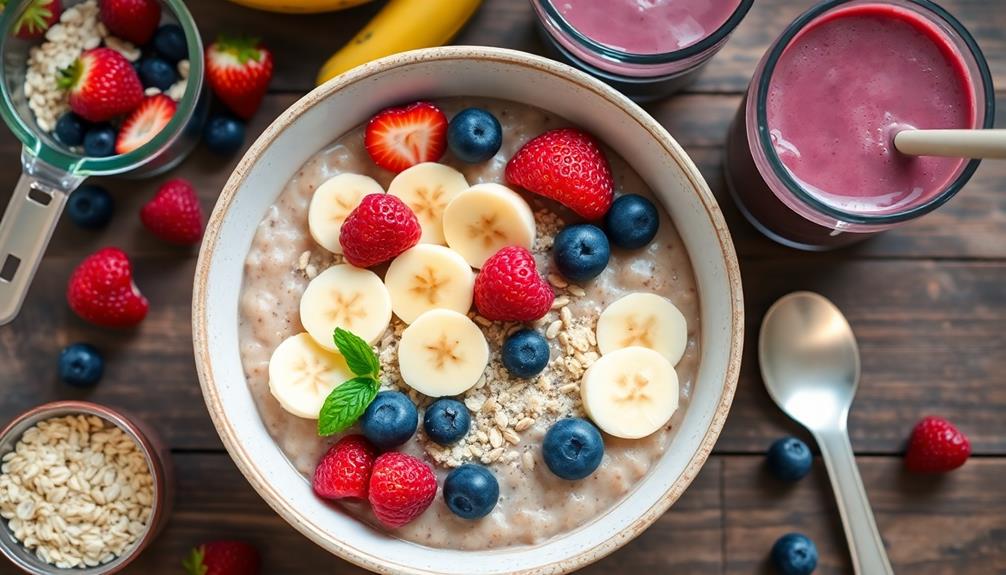
Fiber is essential for your digestive health, helping you maintain regular bowel movements and prevent constipation.
It also supports weight management by keeping you feeling full longer and can lower LDL cholesterol, reducing your risk of heart disease.
Digestive Health Benefits
Harnessing the power of oats can greatly enhance your digestive health. These fiber-rich foods provide both soluble and insoluble fiber, which support regular bowel movements and contribute to overall gut wellness. The soluble fiber beta-glucan found in oats creates a gel-like consistency in your gut, helping to bulk up stool for easier passage. This can be particularly beneficial if you experience constipation.
Regularly including oats in your diet is linked to improved digestive function, allowing your body to process food more efficiently.
Furthermore, oats act as a prebiotic, fostering the growth of beneficial gut bacteria essential for a healthy microbiome. This balance of gut bacteria plays a vital role in your digestive health, helping to ward off gastrointestinal disorders.
The National Institutes of Health recommends fiber-rich foods like oats to reduce the risk of these disorders and support a healthy digestive tract.
Weight Management Support
Often overlooked in weight management strategies, oats can be a powerful ally in your quest for a healthier body. Packed with fiber, a cup of oats delivers about 4 grams, promoting feelings of fullness and helping you manage your calorie intake throughout the day.
The soluble fiber beta-glucan found in oats is particularly effective at stabilizing blood sugar levels, reducing those pesky hunger pangs that can lead to overeating. Additionally, incorporating high-fiber foods like oats can aid in digestive health, which is essential for overall well-being and effective weight management, as highlighted in cold medications overview.
When you make oats a regular part of your breakfast, you're not just enjoying a healthy meal; you're also setting yourself up for better eating patterns throughout the day. High-fiber meals like oatmeal are linked to lower body weight and diminished visceral fat, making them an ideal choice for anyone aiming to shed pounds.
Oats even stimulate the release of peptide YY (PYY), a hormone that increases satiety and further supports your weight management efforts.
Incorporating oats into your diet can be a simple yet effective strategy. So, if you're looking to maintain a healthy weight, consider starting your day with a hearty bowl of oatmeal—it might just be the boost you need!
Cholesterol Reduction Effects
Incorporating oats into your breakfast routine not only supports weight management but also plays a notable role in reducing cholesterol levels. Oats are rich in beta-glucan, a soluble fiber that effectively lowers bad cholesterol (LDL) by 10%-15% when included in a low-fat diet. This reduction is essential because high LDL levels are linked to an increased risk of cardiovascular disease.
Regular consumption of oats can lead to a remarkable 14% decrease in cardiovascular disease risk, largely due to their cholesterol-lowering properties. The high fiber content in oats not only aids in lowering cholesterol but also helps stabilize blood sugar levels, further enhancing your heart health. By managing cholesterol and blood sugar, oats can help mitigate conditions related to high cholesterol and diabetes.
A systematic review confirms that oat beta-glucan considerably reduces total cholesterol and LDL cholesterol, making oats a powerhouse for heart health.
Additionally, including oats in your daily meals boosts your overall dietary fiber intake, helping you reach the recommended 25-30 grams for adults, a goal that many struggle to meet.
Historical Significance of Oats
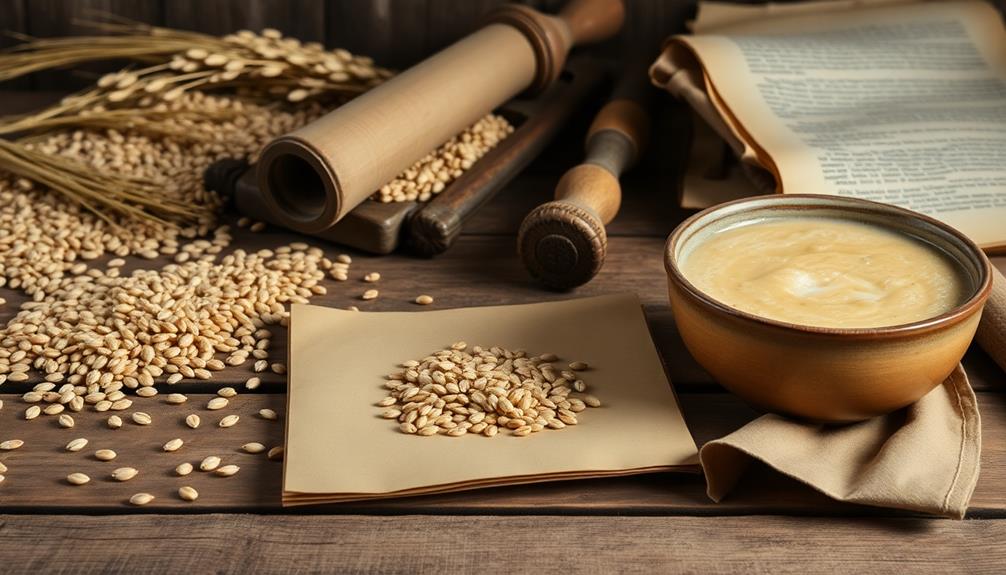
Oats have played a significant role in human history, evolving from a simple animal feed to a cherished staple in many diets around the world. Cultivated around 1000 B.C. in central Europe, oats were initially regarded as fodder by ancient Greeks and Romans. This perception changed over time, highlighting their nutritional importance as they became recognized for their health benefits.
When European explorers brought oats to America in the early 1600s, they quickly integrated into various traditional recipes, becoming a staple food. Scottish and Dutch immigrants were particularly influential, especially in regions like Vermont, where oatmeal consumption soared. Their efforts showcased the historical significance of oats as a versatile human food source.
Throughout the centuries, oats have maintained a long-standing presence in dietary practices worldwide. They've not only contributed to the health and wellness of populations but also adapted to local tastes and cooking methods.
As you explore the benefits of oats in your breakfast, you're participating in a rich legacy that underscores their value across cultures. This journey from animal feed to a beloved food illustrates how oats have woven themselves into the fabric of human nutrition.
Different Types of Oats

When it comes to choosing oats, you've got options that cater to your needs.
Steel-cut oats provide a chewy texture and higher fiber content, while rolled oats offer versatility for various recipes.
If you're in a rush, instant oats deliver quick convenience, though they may lack some of the nutrients you want.
Steel-Cut Oats Benefits
Steel-cut oats stand out among the various types of oats due to their minimal processing and impressive health benefits. Unlike rolled or instant oats, steel-cut oats retain the whole grain, boasting a higher fiber content. Each serving, about 1/4 cup uncooked, packs around 5 grams of dietary fiber, helping you meet the recommended daily intake of 25-30 grams for adults. This fiber aids in digestion and promotes satiety, making them a great choice for weight loss.
Their dense texture and nutty flavor create a satisfying breakfast that keeps you full longer. While cooking steel-cut oats takes about 20-30 minutes, this slower process enhances nutrient retention, delivering a heartier meal.
Rich in essential vitamins and minerals like iron and magnesium, steel-cut oats also contain antioxidants such as avenanthramides, which may help reduce inflammation and support overall health.
Incorporating steel-cut oats into your diet can't only provide you with complex carbohydrates for sustained energy but also contribute to heart disease prevention. So, if you want a nutritious and filling breakfast, steel-cut oats are an excellent option to contemplate!
Rolled Oats Versatility
For a quick and versatile breakfast option, rolled oats have become a favorite among many. Steamed and flattened, these oats cook up fast and fit seamlessly into various recipes, whether you're making oatmeal, granola, or baked goods. With about 4 grams of fiber per cup, rolled oats support digestive health and help you feel full, making them an excellent choice for a healthy breakfast. Incorporating a personal budget can help you allocate funds for wholesome ingredients, ensuring you maintain a nutritious diet.
One of the best features of rolled oats is their customizable nature. You can enhance their nutritional profile by adding your favorite toppings, like fruits, nuts, and seeds, transforming a simple bowl into a delicious and nutritious meal. This flexibility makes rolled oats perfect for meal prepping, allowing you to whip up overnight oats or blend them into smoothies for a convenient breakfast on busy mornings.
Compared to instant oats, rolled oats undergo less processing, retaining more whole grain benefits and fiber. By incorporating rolled oats into your morning routine, you're not only enjoying a tasty meal but also fueling your body with essential nutrients for the day ahead.
Instant Oats Convenience
Embracing the convenience of instant oats can transform your hectic mornings into a quick and nutritious breakfast experience. With just a couple of minutes needed for preparation, instant oats are fully cooked and dried, making them the fastest option available.
However, keep an eye on sugar and flavoring additives in the ingredients. Instant oats can also be a good source of antioxidants, akin to the benefits of Cranberry Juice Consumption, providing additional health support.
Here are some key benefits of choosing instant oats:
- Quick Preparation: Perfect for busy schedules, instant oats cook in no time.
- Fiber Per Serving: You'll typically get around 3-4 grams of fiber per serving, helping you meet the daily recommended intake of 25-30 grams for adults.
- Health Benefits: Despite being processed, instant oats still offer significant health benefits, like cholesterol reduction and improved blood sugar control.
- Soluble Fiber: The soluble fiber in instant oats aids in digestion and enhances heart health.
While they may have slightly lower fiber content compared to rolled or steel-cut oats, instant oats still provide a valuable breakfast option.
Enhancing Your Oatmeal
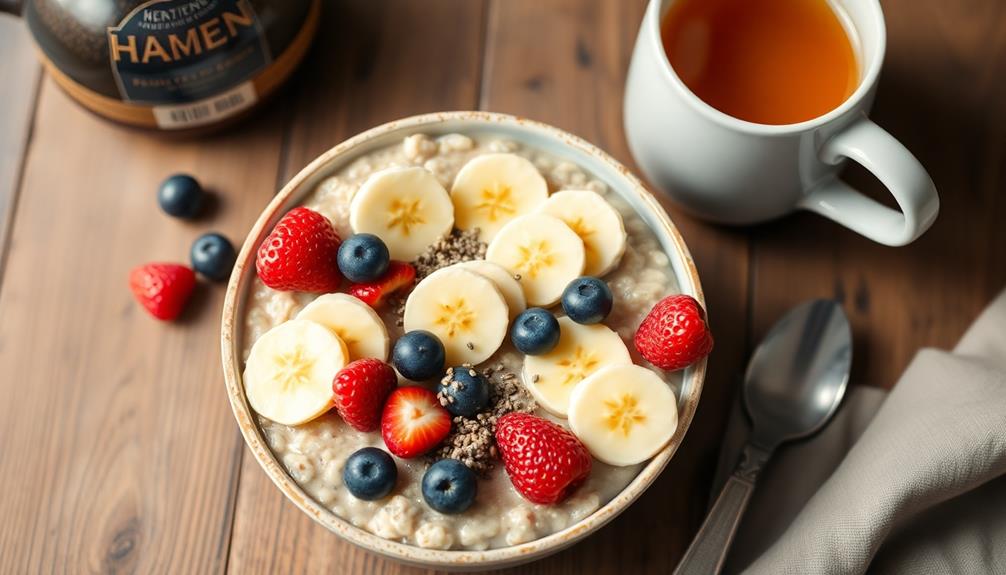
Enhancing your oatmeal can turn a simple bowl into a nutritious powerhouse. Start by preparing your oatmeal with milk instead of water. This switch notably increases the protein and nutrient content, making it a more balanced breakfast option.
Next, consider adding fresh fruit like berries or bananas. They not only boost the flavor but also add fiber, vitamins, and antioxidants to your meal.
Incorporate nuts and seeds, such as almonds or chia seeds, for healthy fats and extra protein. These additions contribute to overall satiety, helping you feel full longer.
Mixing in yogurt is another great idea; it introduces probiotics that promote digestive health and enhances the creaminess of your oatmeal.
If you're looking to sweeten your bowl, opt for low-calorie sweeteners or natural options like honey. These choices enhance the taste without piling on excessive calories, keeping your breakfast healthy.
Weight Management With Oats
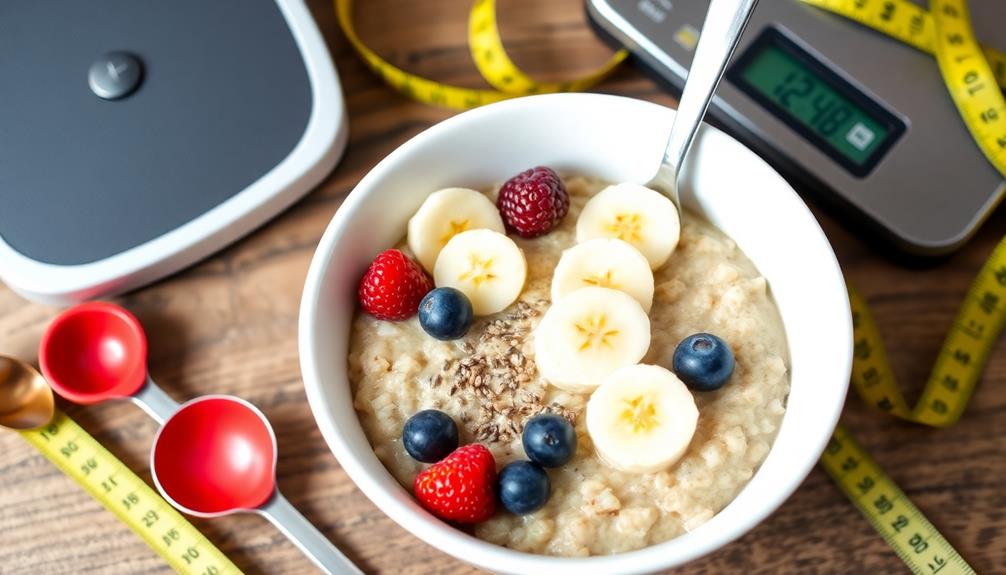
Managing your weight can be made easier with oats, thanks to their impressive fiber content. Oats are rich in soluble fiber, particularly beta-glucan, which enhances feelings of fullness and promotes satiety. This can help you reduce overall calorie intake throughout the day.
Here's how incorporating oats into your breakfast can support your weight management goals:
- Fiber-Rich: A serving of cooked oatmeal provides about 4 grams of fiber, contributing to 16% of the recommended daily value for adults.
- Appetite Regulation: Regularly consuming oats stimulates the release of peptide YY (PYY), a hormone that helps control appetite and further enhances feelings of fullness.
- Low-Calorie Density: Oats allow for larger portion sizes, making them a satisfying breakfast option without excessive calorie intake.
- Metabolic Benefits: Incorporating oats into a balanced diet is linked to improved metabolic health, including better blood sugar control and reduced insulin resistance.
Oats for Digestive Health

Oats not only support weight management but also play an essential role in promoting digestive health. When you incorporate oats into your diet, you benefit from their rich fiber content. A cup of cooked oatmeal contains about 4 grams of fiber, making it a healthy choice for improving digestion. The soluble fiber in oats, particularly beta-glucan, forms a gel-like substance in the gut that aids in bulking up stool and alleviating constipation symptoms.
Regularly eating oats fosters the growth of beneficial gut bacteria, acting as a prebiotic that enhances your microbiome health. This is particularly valuable if you struggle with gastrointestinal issues.
Here's a quick look at the benefits of oats for your digestive health:
| Fiber Type | Benefits | Grams of Fiber per Cup |
|---|---|---|
| Soluble Fiber | Helps bulk up stool, alleviates constipation | 4 grams |
| Insoluble Fiber | Promotes regular bowel movements | 4 grams |
| Oat Bran | Improves digestion, especially in IBS | 6-7 grams |
| Combined with Fruits | Enhances digestive regularity | Varies |
Blood Sugar Regulation
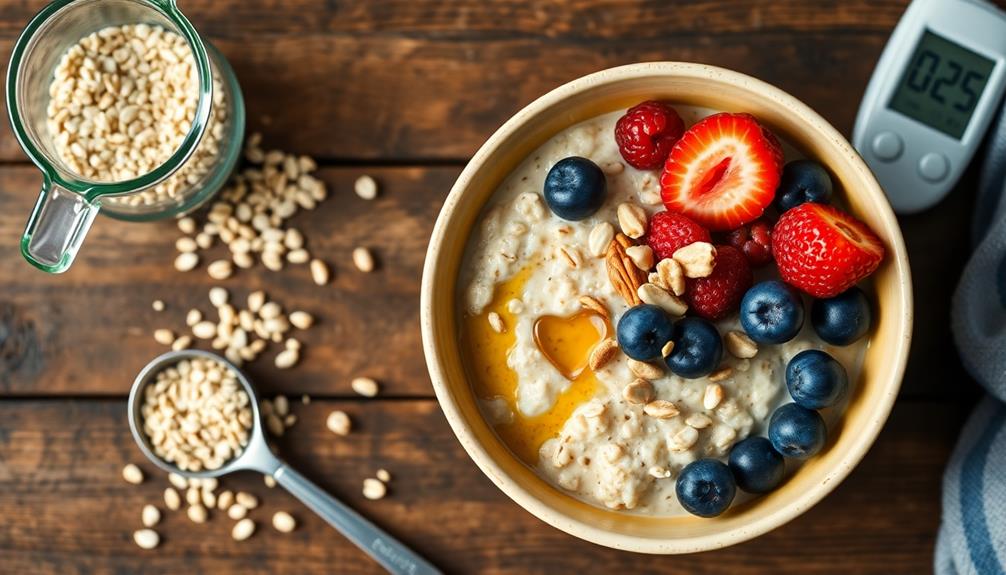
Maintaining stable blood sugar levels is essential for overall health, and incorporating oats into your breakfast routine can help achieve that. Oats are rich in beta-glucan, a soluble fiber that slows down digestion and carbohydrate absorption, resulting in steadier blood sugar levels after meals. This makes oatmeal an excellent choice, especially for those managing diabetes or prediabetes.
Here are four reasons why oats are beneficial for blood sugar regulation:
- Low Glycemic Index: Oats have a low glycemic index, meaning they provide a gradual release of energy, preventing sudden spikes in blood sugar.
- Improved Insulin Sensitivity: Regular consumption of oats enhances insulin sensitivity, which is vital for maintaining healthy blood sugar control.
- Reduced Postprandial Glucose Spikes: Eating oatmeal leads to lower blood glucose spikes after meals, helping you feel more stable throughout the day.
- Enhanced Glycemic Control: Studies show that incorporating beta-glucan from oats can greatly lower insulin levels, improving overall glycemic control.
Skin Health Advantages

When it comes to promoting healthy skin, oats offer a remarkable blend of benefits that can make a noticeable difference. The antioxidant properties of avenanthramides found in oats help protect your skin from oxidative damage while reducing inflammation. This anti-inflammatory action can be particularly beneficial if you're dealing with dermatological conditions like eczema, as oats work to soothe and calm irritated skin.
Additionally, oats contain beta-glucan, which greatly improves skin hydration. This means that not only do oats nourish you from the inside out, but they can also be applied topically to help alleviate dryness and irritation. Colloidal oatmeal, derived from oats, is FDA-approved for skin protection and is often used to relieve itchiness.
Regularly including oats in your diet can contribute to overall skin health due to their rich nutrient content, including essential vitamins and minerals. By incorporating oats into your daily routine, you not only enjoy a delicious breakfast but also invest in your skin's well-being.
Frequently Asked Questions
Is a Bowl of Oatmeal a Day Enough Fiber?
A bowl of oatmeal a day isn't enough fiber on its own. You'll want to add fruits, nuts, or seeds to boost fiber intake and help you reach the recommended daily amount for ideal health.
Is It OK to Eat Oatmeal Everyday for Breakfast?
Yes, it's perfectly fine to eat oatmeal every day for breakfast. It provides essential nutrients, keeps you full longer, and supports heart health. Just mix it up with toppings to keep things interesting!
Is There a Downside to Eating Oatmeal?
Yes, there're downsides to eating oatmeal. You might experience bloating or gas if you eat too much fiber too quickly. Instant oats can have added sugars, and gluten contamination's a concern for some individuals.
What Is the Best Oatmeal for High Fiber?
For high fiber, you'll want steel-cut oats, as they provide about 5 grams of fiber per cooked cup. Oat bran is also excellent, offering around 14 grams per half-cup, making it a fantastic choice.
Conclusion
Incorporating oats into your breakfast is like planting seeds of health in your day. With their rich fiber content, they're your trusty allies for digestive harmony and steady energy. Picture each bite as a warm embrace, nourishing your body while keeping your cravings at bay. So, as the sun rises, let a steaming bowl of oatmeal be your canvas, painted with fruits and nuts, setting the tone for a vibrant, healthful day ahead.

